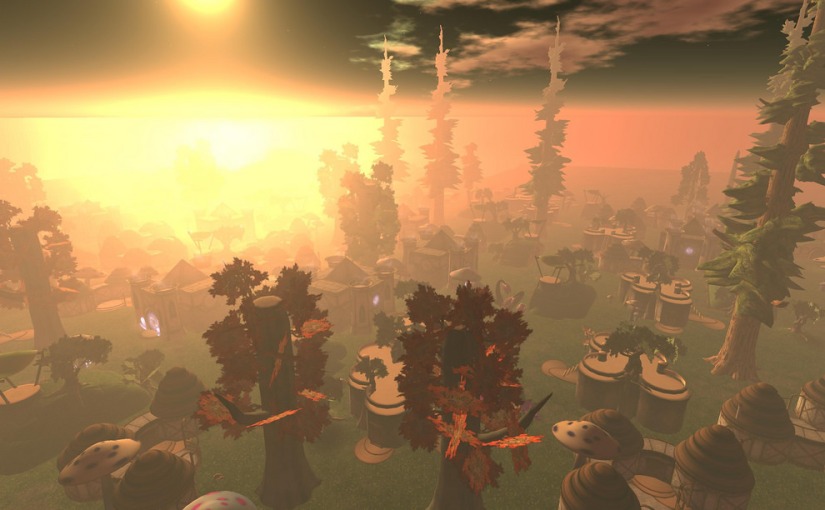Ever since Ultima online gained popularity in 1997, the MMORPG genre has been growing and is guilty of being both rip-offs of other great MMORPGs as well as too experimental. Sure, there were some brilliant new ideas such as Eve Online and some crowd favourites which never kicked off like The Chronicles of Spellborn and Zu Online. However, the aim of the game has always been to capture the audience with a new style of MMORPG and then keep them there for as long as possible. Very few games, however, actually managed to keep their audiences after roping them in. There is the uniquely designed Aion Online, the fluid hack and slash combat of Cabal Online, the amazingly detailed Tera Online and the colossus of them all – World of Warcraft. These are obviously not the complete list of successful MMORPGs, there is Final Fantasy XIV, the aforementioned Eve online and many more. However, this genre seems like it isn’t very popular currently. MOBAs took the floor for a while like Dota 2 and League of Legends, followed by MMOs like Overwatch and Warframe. Currently, the market seems dominated by the Battle Royale genre with Player Unknown’s Battlegrounds (PUBG) and Fortnite ruling the roost. How the market would proceed from here is anyone’s guess, but there is also the chance that there could be complete reversal of trend with people returning to older genres. After all, World of warcraft is supposedly showing its all-time highest subscribers and most of the games I mentioned have a loyal audience who still play them and bring in their friends as well. All points considered, let’s daydream a little and speculate how a reversal into MMORPGs could go about. The best way to start would be to think of what made them fail in the first place.

Innovation: While some people love the tried and tested rules like classes, levels, skills and talents, some games broke all these boundaries and other aspects either replaced them or diversified them. Yesteryear’s Silkroad had the unique 3 job system where you could play as a merchant, thief or hunter, while Dekaron (2 Moons) had the traditional ideas like tank, mage, healer, etc. The interface was experimented with from all angles with 2D, 2.5D and 3D MMORPGs while the UIs came in all shapes and sizes. All of this impacted gameplay in their own ways but arguably not as much as the combat system. Almost every game was a point-click and spam skill buttons sort of experience like World of Warcraft, Lineage 2, 9Dragons, but there were expansive ideas like the reticule system in The Chronicles of Spellborn, Tera and Neverwinter. Some games even gave you multiple ways to move and fight based on your preferences. Innovation is thereby just a fresh take and a new perspective on doing things differently in a game.
Reasons for Innovation failures:
- Too weird in their approach
- Too generic or poorly designed
- Uninteresting or complete dead end direction

Graphics: “Graphics maketh the game” – a statement which has been proven untrue more times than some people would like to agree. There are so many instances where weird and dated looking games have bested their visually astounding rivals. Is it fun that makes the difference? Most likely, but that too is a choice of words which needs a lot of thought. Tera online, Black Desert Online and Final Fantasy XIV for instance are both visually stunning and fun to play. What draws the line between graphics and fun then? Well, this is a can of worms that needs quite a lot of insight into. Some players argue that they prefer FPS games like Quake and Doom and others love the 3rd person perspective, both of which can be equally fun to some other players. I know some people who just live to play platformers while some might like top view perspective such as The Sims or Civilization players. Graphics can make or break a game but not only when it changes the gameplay. There are other elements which hold a lot of weight when you have to face the same controls, interface and options routinely if you dedicate your time to an MMORPG. A great game with bad camera angles can make it terrible and nauseating and don’t get me started about a bad UI scheme. However, one huge factor that comes into play is the system requirements. Not everyone has an amped up computer and not everyone can afford a console. In fact, you will find a good numbers of people on dated games only because that is what their pockets allow. New engines, higher graphics and resolution are what send many people running in the opposite direction. Does this mean we need to kill the ‘latest and greatest’ in gaming technology? No, not quite. However, there are some games which transcend this limitation and give you a good experience even with a low end rig. This realization occurred to me when Blade & Soul made its entrance to the English market. My computer was good enough to run everything at max graphical settings while a friend of mine could manage a playable 30 FPS with low graphics. The end result was that while I found the style and graphics of the game gorgeous, my friend got a pretty ugly variant of the same. I couldn’t convince him to play B&S with me a second time. However, we did play World of Warcraft almost every day on these same machines and a side by side comparison of the game on DirectX9 with low graphics vs DirectX 11 with ultra graphics will show you the difference. The game doesn’t suffer anywhere as much as most others. The answer is simple: Optimization and style. WoW is designed with a style that is neither too cartoony nor realistic. The graphics might be lowered but the style remains the same. Not all games will manage this, but this is one of the best examples I could give you.
Reasons for graphics failures:
- Optimization – the game looks terrible when the graphics level is reduced
- Style – Though some may not prefer it, a realistic style can cause the game to look bad without the right hardware to support it
- Multi-platform support – games which runs on consoles, PCs and across different Operating systems are usually more easily welcomed. Example: Dota 2 or Fortnite.

Community: You would find this word thrown about quite a bit, but what does it mean? Does community have to do with the in-game guilds and factions or does it include the forums and threads or blogs as well? The answer is simple and yet complicated. Game communities can mean all of these mediums and much more. Games have thrived with excellent guilds, websites that guide new and veteran players and also great developer support but sometimes this may not be done in the way expected of it. For instance, I have come across games which had the primary in-game community systems as guilds and factions. This works at times but succeeds only when a certain guild has the best and most active players. Unfortunately, almost every game seems to limit the maximum players a guild can have. There can be various technical reasons for this, but in order to overcome the issue, some games have interconnected guilds. One example I can think of is 9Dragons. Though the actual player base might be low since the game is hard core grind fest, it had a hero guild which can have a set of players under one ‘Hero’ (read: Guild leader). This hero guild is then interconnected into a bigger faction which consists of other hero guilds and finally there was a nation chat which would allow communication on a larger scale. Communication also has one important element: trade and economy. Players want to find rare and expensive virtual items in their adventures and if these items are tradeable, they want the best price they can sell it at. Games have taken many different approaches to this. Some allowed you to make a ‘shop’ with your character and leave it online doing nothing while your items are sold. Others allow you to place them in Auction houses which provide you with the current going rates and then sell your items for a cut from the sales price. Both methods have their pros and cons, but the most satisfying sales are those which sell after making an announcement in game chat or trade chat and finding a buyer for them. Though it seems negligible, many players have pulled on in arduous MMORPGs just because of the great feeling they get of making virtual currency. They don’t just ‘make money’ in game, they also form a circuit of regular customers, acquire friends and generally get the feeling of a robust economy in the game. This is the essence of a good game community and this is what keeps long terms players going.
Reasons for Community failures:
- Too complex and making it hard for players to interact
- Lack of good curated forums and guide articles to keep players engaged
- Scammers and Bots causing mistrust and economic or gameplay damage
- Lack of support for add-ons which could bring quality of life changes to the UI

Security: One aspect which almost every game has started to take very seriously is Security. They implement 2 step verification, additional login passwords and other general security measures. Sure, this protects the accounts from scammers and saves players from account theft. However, there is another aspect which causes players to turn away from a game quite quickly: Bots and Gold sellers. This plague of bots and gold sellers started right from the beginning when the MMORPG market started to boom. Almost every game you log into, you are promptly greeted by Gold selling site messages that make trade and global chat almost unusable. It can be overwhelming to players to have to add a long list of scammers and spammers to their blacklist every single day and their trust in the developers takes a death blow. Sure, games have come up with ideas such as buying virtual currency from the game site officially, but this doesn’t stop the plethora of spam messages selling in game currency cheaper than them. There is no straight answer to this issue as security is near impossible when you have millions of players logged in at the same time. The developers rely on players reporting such occurrences to them and while the reports flood in, the response is almost never immediate. In all likelihood, by the time a report is addressed, the scammer has probably shifted into a new character. Some games take their security very seriously and there have been instant bans on players right after they do something shady in game. There has even been legal action taken against these players causing an uproar in the gaming community. However, the security is something that relies wholly on the players themselves. Every time someone buys gold from those gold selling sites, it encourages them to set up more bots and hence damage the game community and economy even more. Every time someone hacks their way to victory, they make several players quit the game. They so desperately want to be the best in their favourite game that they hack it and lead to their favourite game being damaged.
Reasons for security failures:
- Indifferent developers to player’s woes
- Lack of updates and actions against the scammers and spammers
- Lack of incentive to players that report hackers (Eg: If you report a hacker, the first report gets x amount of in game currency.)

Conclusion: Whether or not these aspects are handled well, the gaming industry will keep churning out title after title, experimenting with almost every genre. Every successful game will then spawn a multitude of clones and before long, the cycle of life and death of a gaming genre happens all over again. Whatever your favourite genre is, you can rest assured that it will never go out of style. Not all of us have a good circle of friends that play with us and some of us are always on the lookout of building such a circle. Whether you are a lone wolf or part of a wolf pack, gaming is what we all desire and our quest to find our perfect game causes us to try and try again, no matter how exhausting or futile our search is. All I can say is, keep up the gaming spirit and may you find that perfect moment in gaming you would cherish for life!
